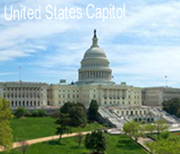FREE NEWS LINKS

HOME SEARCH
Updates & changes ongoing ....
---- Although this site is https-secure, we cannot guarantee that it or any provided links are safe; be sure your antivirus and other security systems are up to date.
Also see: Free trade; taxes; wall; Congress;
Jump to: 2017;
Undated: A border-adjustment tax (also known as a border-adjusted tax, destination tax, destination-based cash flow tax or a border tax adjustment) is a tax on goods based on location of final consumption rather than production.[1] It allegedly eliminates incentives for companies to reduce their tax bills through tax inversion and intangible asset relocation.[2][3][4]
The concept of a border-adjustment tax was originally the subject of a 1997 article by economist Alan J. Auerbach.[5] Auerbach worked with Michael Devereux, who had introduced with Stephen R. Bond, the term destination-based corporate tax. Auerbach described a system that he claimed would align business incentives with the national interest.[2]
Back to top
In theory, a border-adjustment tax is trade neutral: the stronger domestic currency would make exports more expensive internationally, lowering demand for exported products while reducing the costs incurred by domestic firms in purchasing goods and services in foreign markets, helping importers. Thus, the anticipated strengthening of the domestic currency effectively neutralizes the border-adjustment tax, resulting in a trade-neutral outcome. However other studies indicate that currency adjustments may not always flow through to price adjustments, shifting the incidence of the tax to consumers and/or producers.[6]
In the United States, the Republican Party in 2016 included most of Auerbach's recommendations in their policy paper "A Better Way — Our Vision for a Confident America",[7] which promoted a move to "a destination-basis tax system."[8]:27[9] As of February 2017, the proposal was the subject of heated debate - with Gary Cohn, Director of the National Economic Council opposing it[10] and the Koch brothers-funded Americans for Prosperity (AFP) lobby group, unveiling their plan to fight the tax.[11]
https://en.wikipedia.org/wiki/Border-adjustment_tax
-- 2017 --
Back to top
January 16: trump warns against a border adjustment tax advising that it would be too complicated.
https://www.wsj.com/articles/trump-warns-on-house-republican-tax-plan-1484613766
February 23: Treasury Secretary Steve Mnuchin says the trump administration will pass a border tax bill before August.
http://www.cnbc.com/2017/02/23/treasury-sec-mnuchin-says-were-committed-to-very-significant-tax-reform-by-august-recess.html
February 24: trump advises border tax could boost U.S. Jobs
http://www.reuters.com/article/us-usa-trump-tax-exclusive-idUSKBN1622J5
February 27: Federal Reserve's economists don't like the border adjustment tax.
http://money.cnn.com/2017/02/27/news/economy/border-adjustment-tax-trump-trump-congress/?iid=EL
February 27: It's Americans, Not Mexicans, Who Will Pay the Border Tax
http://fortune.com/2017/02/27/border-tax-costs-investments/
April 10: The political network funded by Charles and David Koch is seizing the break on Capitol Hill to try to torpedo a key part of the Republican tax bill
http://www.cnn.com/2017/04/10/politics/border-tax-kochs-gop/?iid=ob_lockedrail_topeditorial
April 10: “I don’t like the word ‘adjustment’, because our country gets taken advantage of, to use a nice term, by every other country in the world,” Trump told Fox Business News in an interview that aired on Wednesday. “Adjustment means we lose. We lose.”
“Let’s call it an import tax. Let’s call it a reciprocal tax,” he added. “Nobody gets angry when you say reciprocal tax.”
http://www.reuters.com/article/us-usa-trump-tax/trump-objects-to-terminology-of-border-adjustment-tax-idUSKBN17E2DM
Back to top
May 7: A key part of congressional Republicans' tax reform plan, the border adjustment tax, is "not productive," retail veteran and former Varsity Brands CEO Matt Rubel told CNBC on Friday.
He believes the provision, which would slap a 20 percent tax on imports, will have a negative impact on the economy, of which consumers are the biggest part. That's because it will raise prices on imported goods
https://www.cnbc.com/2017/05/05/border-adjustment-tax-is-not-productive-varsity-brands-ceo-says.html
May 24: The proposal to tax imports and exempt exports has been facing long odds for several months, with retailers, conservative groups and senators warning that it would lead to consumers paying more for items such as clothes and groceries ... border-adjustment tax proposal is increasingly looking like it’s on death’s door.
http://thehill.com/homenews/house/335038-border-adjustment-tax-proposal-at-deaths-door
June 20: ... border adjustment tax would amount to a $5 trillion tax hike on consumers
http://thehill.com/blogs/pundits-blog/economy-budget/338634-new-border-adjustment-tax-would-amount-to-a-5-trillion-tax
July 27: House Speaker Paul D. Ryan (R-Wis.) has agreed to jettison one of the most controversial aspects of his tax overhaul plan, clearing the way for the White House to move forward on its plans for sweeping tax cuts later this year.
After months of talks, Ryan and House Ways and Means Committee Chairman Kevin Brady (R-Tex.) have backed down on their demand that any changes to the tax code include the imposition of a new “border adjustment tax” on imported goods, at least in the short term.
https://www.washingtonpost.com/news/wonk/wp/2017/07/27/paul-ryan-admits-defeat-giving-up-on-border-adjustment-tax/?utm_term=.91ee4928cb3d
July 27: The Trump administration and congressional Republican leaders have ditched a controversial border-adjusted tax proposal as part of an effort to present a united front for a broad tax overhaul.
http://www.latimes.com/business/la-fi-tax-reform-border-20170727-story.html
Back to top
Webpage visitor counts provided by